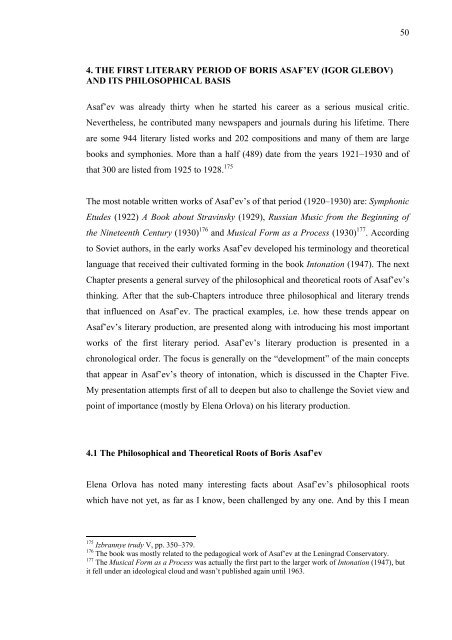Boris Asaf'ev and the Soviet Musicology - E-thesis
Boris Asaf'ev and the Soviet Musicology - E-thesis
Boris Asaf'ev and the Soviet Musicology - E-thesis
Create successful ePaper yourself
Turn your PDF publications into a flip-book with our unique Google optimized e-Paper software.
4. THE FIRST LITERARY PERIOD OF BORIS ASAF’EV (IGOR GLEBOV)<br />
AND ITS PHILOSOPHICAL BASIS<br />
Asaf’ev was already thirty when he started his career as a serious musical critic.<br />
Never<strong>the</strong>less, he contributed many newspapers <strong>and</strong> journals during his lifetime. There<br />
are some 944 literary listed works <strong>and</strong> 202 compositions <strong>and</strong> many of <strong>the</strong>m are large<br />
books <strong>and</strong> symphonies. More than a half (489) date from <strong>the</strong> years 1921–1930 <strong>and</strong> of<br />
that 300 are listed from 1925 to 1928. 175<br />
The most notable written works of Asaf’ev’s of that period (1920–1930) are: Symphonic<br />
Etudes (1922) A Book about Stravinsky (1929), Russian Music from <strong>the</strong> Beginning of<br />
<strong>the</strong> Nineteenth Century (1930) 176 <strong>and</strong> Musical Form as a Process (1930) 177 . According<br />
to <strong>Soviet</strong> authors, in <strong>the</strong> early works Asaf’ev developed his terminology <strong>and</strong> <strong>the</strong>oretical<br />
language that received <strong>the</strong>ir cultivated forming in <strong>the</strong> book Intonation (1947). The next<br />
Chapter presents a general survey of <strong>the</strong> philosophical <strong>and</strong> <strong>the</strong>oretical roots of Asaf’ev’s<br />
thinking. After that <strong>the</strong> sub-Chapters introduce three philosophical <strong>and</strong> literary trends<br />
that influenced on Asaf’ev. The practical examples, i.e. how <strong>the</strong>se trends appear on<br />
Asaf’ev’s literary production, are presented along with introducing his most important<br />
works of <strong>the</strong> first literary period. Asaf’ev’s literary production is presented in a<br />
chronological order. The focus is generally on <strong>the</strong> “development” of <strong>the</strong> main concepts<br />
that appear in Asaf’ev’s <strong>the</strong>ory of intonation, which is discussed in <strong>the</strong> Chapter Five.<br />
My presentation attempts first of all to deepen but also to challenge <strong>the</strong> <strong>Soviet</strong> view <strong>and</strong><br />
point of importance (mostly by Elena Orlova) on his literary production.<br />
4.1 The Philosophical <strong>and</strong> Theoretical Roots of <strong>Boris</strong> Asaf’ev<br />
Elena Orlova has noted many interesting facts about Asaf’ev’s philosophical roots<br />
which have not yet, as far as I know, been challenged by any one. And by this I mean<br />
175 Izbrannye trudy V, pp. 350–379.<br />
176 The book was mostly related to <strong>the</strong> pedagogical work of Asaf’ev at <strong>the</strong> Leningrad Conservatory.<br />
177 The Musical Form as a Process was actually <strong>the</strong> first part to <strong>the</strong> larger work of Intonation (1947), but<br />
it fell under an ideological cloud <strong>and</strong> wasn’t published again until 1963.<br />
50

















